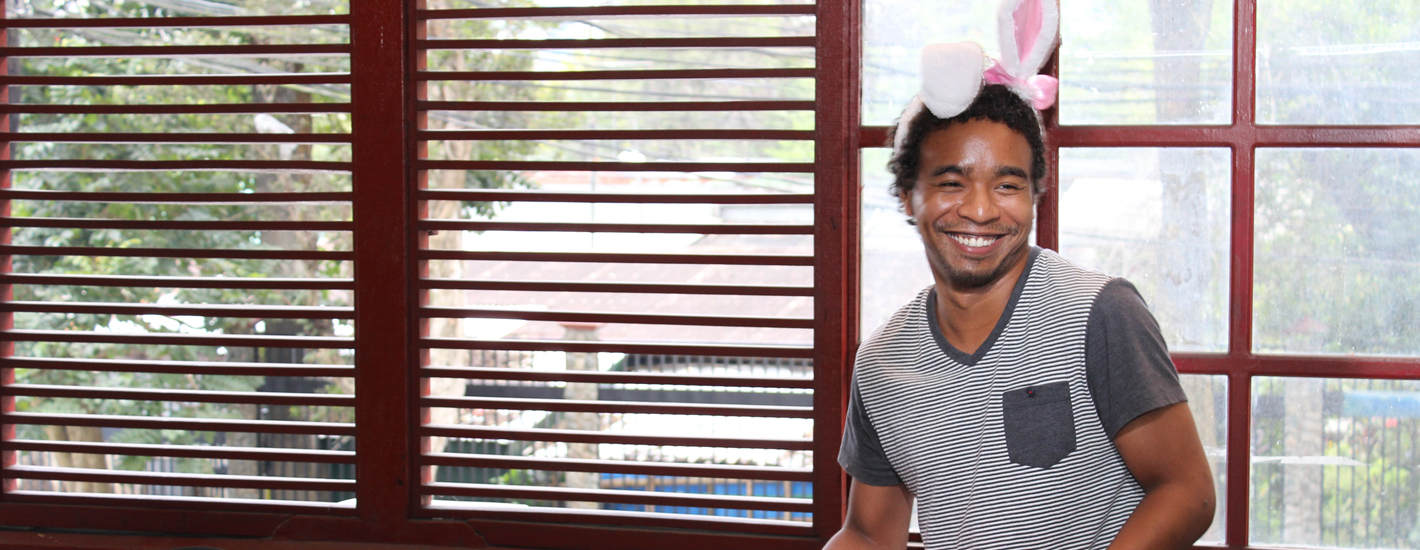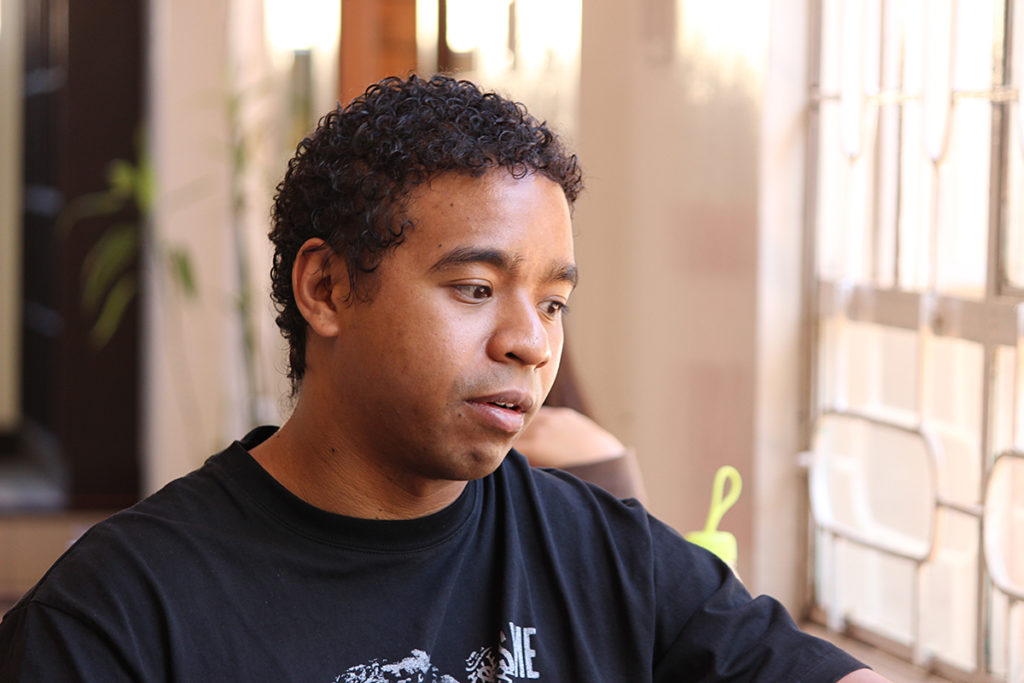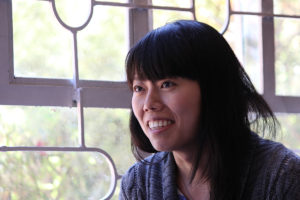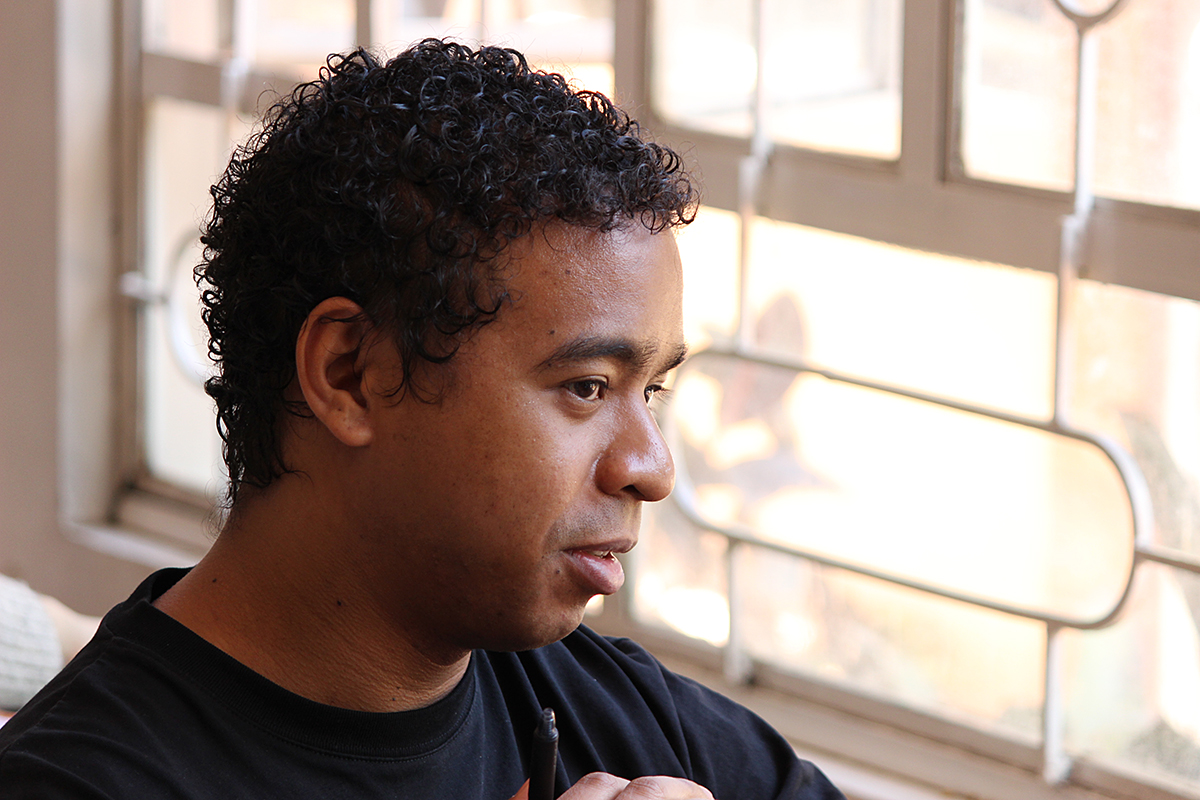
PERSONAL

Naru: Could you say something about yourself?
John: My name is Jonathan Hull. I’m from Sacramento, California. I was born and raised there, and I’m currently 31 years old.
Naru: Before coming to the Philippines, what did you do in the US?
John: I was in university. I was also working as a security guard. I was working as a parking lot security from 4 p.m. to 12 a.m., and from 1 a.m. to 4 a.m. – sometimes 3:30 – I was working as club security.
Naru: What are your hobbies?
John: My hobbies revolve mostly around sports and computers. I like to play all kinds of sports. When I have the time or when I have people to play sports with, I do it. I also like to go online and watch YouTube videos, play video games, and stuff like that. And I like music. If I have a guitar, I usually play it. But nowadays I don’t have a guitar. Oh, and recently I’ve been working out at the gym. I just started last week, but I hope this trend will continue.
Naru: What do you do in your free time?
John: Most of my free time is spent in front of my computer or out with students, having a meal or a few drinks.
PHILIPPINES, BAGUIO & A&J
Naru: How did you learn about Baguio?
John: I learned about Baguio when my business partner decided to invite me to start a school here back in 2008.
Naru: What surprised you the most about living in the Philippines?
John: I don’t really know if anything really surprised me. There are a lot of things I had to get used to when I came here. Most of it had to do with living in the Academy with students and staff. I had to deal with the lack of privacy, but that’s something I easily overcame. The good thing is that I’m never really lonely, so yeah.
Naru: What are the advantages of studying English in the Philippines?
John: For the students, it’s very economical. I mean it’s not the US or Canada or Australia or England. But the majority of the people here can speak English at a very conversational level, so it’s a good place to start for beginner students. You know, it’s a good place to get a good footing in English conversation, and like I said it’s very economical. You don’t have to spend so much money. Life here is pretty cheap.
Naru: How is it like working with Filipino teachers?
John: It’s good. I mean it’s easy to collaborate with them because we’re usually on the same page. When it comes to like teaching grammar, reading, writing, speaking or whatever, we always work together.
Naru: What do you think of Filipino English proficiency?
John: Filipinos generally speak good English. Of course, the expressions that they use are quite different from American English expressions, but overall we can communicate very well. People around the world – other English speakers around the world – would be able to communicate with Filipinos in English pretty well.
TEACHING
Naru: When do you feel happy as a teacher?
John: Of course, I feel happy when I see the students are learning something from my lessons, applying what they learn, especially during free time. I like to see that.
Naru: From your teaching experience, do you feel any differences between Korean and Japanese when it comes to studying habits?
John: Japanese students, they know more what they have to do improve their English. What I mean by that is, like during their study time, during their free time, they use English because they want to practice it. For Korean students, they generally have an on-off switch. During study time they study really hard – and that’s good, but during their free time they switch off and they go to “Korean-only” mode. They speak Korean with friends more often than we’d like them to.
Naru: I think you don’t force them to speak only English.
John: I’ve been teaching for 10 years. During my first few years of teaching, I was pretty strict about that. I used to force to students all the time, and I got tired of it. We used to be a Sparta-style academy. Now we are semi-Sparta. I believe that since they are adults, they are mature enough that they don’t need to be told what to do. They know what they’re supposed to do. I don’t want to force anybody. If you really want to learn, you’ll do it. If you don’t, then maybe it’s not your time. Maybe you need time to get into it yourself. I don’t want to force anyone anymore.
Naru: What do you pay attention to when you teach English?
John: Depends on what I’m teaching. Nowadays most of my classes are conversational, so I focus on expressions that they use, pronunciation, stress points, stuff like that. Vocabulary… Not so much on grammar, nowadays. I mean, yeah, if they say something that would make comprehension a little bit difficult, I kind of try to correct them. But my focus is on them trying to speak more and be more confident with what they say. We do the polishing part later.
Naru: How do you make them be more confident?
John: Get them to speak more, and let them say things without correcting them so often. Try to be more enthusiastic in their conversation. Let them talk about things that they like to talk about, and ask more questions. Let them say more, and when they feel that they can talk to me without thinking too long or anything like that, we start polishing.
Naru: I think Filipino teachers sometimes talk too much.
John: What I don’t like in my class is dead air. I don’t want to ask a question and have the student think for 1 minute and say nothing in between, otherwise it sounds like they’re finished talking. It’s hard to keep the flow of the conversation that way. It gets awkward, and I’m not sure if the other teachers feel the same way. But maybe that’s why they are talking so much. Let’s say if I ask questions to students and they gave me 1 or 2-word answers, and I just stare at them for a minute waiting for them to speak more, I think it’s not fair for either the teachers or the students because it sounds like the teachers are not interested in their job and seems like student just doesn’t have anything to say. The level of speaking too much or talking too little is not very clear. I don’t know. Some teachers do just generally talk too much, perhaps.
Naru: What surprised you the most about your students?
John: When I started teaching, the attitude of students in Asia is stricter than students in the United States. Coming from personal experience, when I was in high school, middle school, university, I didn’t really study so hard because I felt like I didn’t really need to study that hard. I just, like, looked for context clues and stuff like that. And also there’s a different way of learning. For example, when it comes to learning for vocabulary, a lot of my students just sit down in one place and just like trying to memorize 20, 30 words at a time, just cramming them into their skulls. I would say they have a very strong attention span. If that were me, I’d probably just sit down for 3 minutes and just, like, go somewhere else.
Naru: How can students improve their proficiency, and what kind of learners improve fast?
John: It depends on their goals. For example, most students want to be better speakers, right? So what they’ll have to do is – simply put – they’ll have to speak more. After speaking more, they’ll have to notice their mistakes and be aware of things that they say. And they’ll have to remember that the expressions that they want to use, just keep trying to apply them over and over and over again. Those who want to become faster at reading or have better comprehension, just read more. Practice makes perfect. They say the best ratio for practice and study is like 80:20. 80% practice and 20% study, or 8 hours of practice and 2 hours study a day. The ones who are very serious about their studies, the ones who recognize what they want out of studying English, the ones who really try hard to get will improve fast. Those who come here and be like “I think that since I’m in the academy, I’m automatically going to get good at speaking English,” no, that’s not the correct attitude to have when you enter the academy.
Naru: How should students behave towards others from other countries?
John: They shouldn’t be shy. They should do their best to try to communicate with them because experience can really go along the way when learning a language.
Naru: What do you think about students using slang very often?
John: If the students tend to use slang, that tells me that they have reached a certain level of comfort in using English and their confidence has come up to a certain point, which is very good because it tells me that they can go on to the polishing process and start focusing on proper English instead of slang. I would actually try to encourage students to speak more casually in the beginning because it’s easier to polish that than it is when going from formal to casual.
Naru: I think sometimes students might be rude because they don’t know the certain word in the beginning.
John: As an educator, you learn to tolerate such things because they are learning. All of these things are forgivable like they might say a word that’s kind of off-color. You just have to let them know this certain word or expression is not acceptable in many social situations. If they say something that might be offensive in any kind of way, or if they react in any kind of offensive way, I just let them know. I’ll say, “Native English speakers might feel this way about it, so try not to use it,” or something like that. But it’s okay. I don’t get offended.
Naru: Why is studying English important?
John: It’s because English is considered one of the universal languages in the world. I don’t think it’s important to study English but any other language – Spanish, French, Dutch, Mandarin… Studying a language like English would help you communicate with other people around the world. It’s good. If you can communicate with others, that means you can connect with others and understand others better, which leads to a more peaceful world, right? There was a guy named Charlemagne, and he said, ”To have another language is to possess a second soul.”
Naru: When do you feel it’s hard to teach English to students who come from different countries?
John: I think the hardest time for me to teach English is when I feel that the student doesn’t really want to learn, or they’re not really interested in the lesson. If he doesn’t show any effort to improve, then I feel like it’s just a routine day at the factory or something. Just put on a suit and tie and do what I have to do, and then after class, it’s just whatever.
Naru: If that happens, what would you do?
John: I would still teach, but the expectations that I get from the student isn’t very… There are students who just do what they think they have to do. You can’t really feel that they want to learn like that drive is there. Like I said, if they come to the academy, they’re automatically going to learn – that’s not true. You have to find, you have to feel, you have to see it in the student’s eyes and in their efforts that they’re really trying to learn. If I don’t, it’s hard.
Naru: You’ve been teaching for 10 years. Have you ever felt like quitting this job?
John: No, I haven’t. I feel that this is my life’s calling? I feel like I found the thing that I want to do in my life. I mean, if I wanted to quit, I would’ve done so within the first year. It’s a very satisfying, rewarding job. You get to meet new people all the time. You watch people grow and improve. You build relationships. It’s really good.
NATIONALITY

Naru: What’s the difference between Western and Asian people?
John: Well, it’s hard to say because there are many different cultures in Asia. There are many different cultures in the west as well. In general, I would say Asian people prefer to keep to themselves whereas westerners are more sociable. We’re no stranger to other people, like, we like to ask questions or talk to people who are complete strangers. Let’s say on the bus or in the coffee shop or restaurant, we try to strike up a conversation with anybody, even just passing people down the street. Asian people, based on what I’ve noticed, they don’t really like to be bothered. They keep to themselves. And another thing is that a lot of Asians would say that they see themselves as a group. For example, when they go out and hang out in groups, they like to be together all the time. That’s cool. In the US, when we get off work, we don’t know the other person. I mean we do, but… My coworkers, I see them at work and we are really good friends. Off work, if we run into them like in the store, we just like “Hey, what’s up? See you at work.” If it’s one of my friends from the neighborhood or something, then we really stay and talk a little bit more. We value “alone time” …pause.
Naru: How do you find the Japanese people?
John: They are very polite, very driven. They know what they have to do. They recognize their responsibilities and goals and always try hard to fulfill them, which is very good, very methodical in a good way. Very kind. Warm-hearted.
Naru: How would you describe your fellow Americans in general? Because I’ve never met an American except for you, but I think you are not a typical American. I have imagined them to be because you are polite, calm and considerate.
John: Just kidding. I would say Americans are proud of a group of people, like patriotic. They’re a warm-hearted, very sociable, sometimes very laid-back, sometimes very nosy, pretty straight-forward group of people. I would say that we describe a lot of things and tell it like it is.
Naru: I wonder if your character is from personality or nationality.
John: From my stay here, there are a lot of things that have changed about me, you know, to kind of my blend in with my surroundings, to adapt to my surroundings. I believe that deep down I’m still as American as they come. But because of my environment, I’ve learned to adjust and make little changes to fit, and I believe that my experience here has changed some parts of me, like, permanently. But there are other parts that are still American down to the core. I’d say that I’ve learned to be a little bit more careful with words that I say, and I’m a little bit more of a social-type person than before. When I was back in California, I liked to keep to myself a lot, especially in my free time. I just stayed indoors or hung out with a small group of friends, but now I like to hang out with a large group of people. I think those little changes are because of my stay here.
Naru: Do you think Asian people have “Native allergy”?
John: I don’t know. Some of it might come from fear, or some of it might be because they don’t want to be bothered, perhaps. A lot of my students do kind of clam up when they meet some other native English speaker, but others try to be a little bit more social. I’d say it really depends on the personality of the individual. It’s interesting because people didn’t mind standing next to me or sitting next to me on the train when I was in Korea. If anything, I was the one who was a little bit shy because obviously, I was different from most people there, but people didn’t seem to care. So I thought it was pretty cool. I don’t know. In Japan, are they afraid that foreigners might start talking to them or something? It could be a Native allergy. It’s okay though.
Naru: What are your plans for the future?
John: If everything goes according to plan, then I will be working in Korea in the near future as an English teacher. Also, I’ll be trying to devote my free time to get a master’s degree, and afterward I would like to try to be a professor in university later on in the future. Maybe at the same time, I’ll start a new business like a café or a little lounge because I like to cook. I’m not good at it but if I learn more, maybe I can do something with that. In the near future, I’ll work more as a teacher in a different country, like in Korea and hopefully in Japan, too. If everything goes well I’d like to go to both countries and work back and forth. Ultimately, though, I’d like to become a much better teacher and develop a really good style of learning English. I’d like to leave that kind of legacy.

Naru: He is very popular to students both in his class and after class. I was a little bit surprised by him during his interview because I can sense that he is not only a teacher but also knows how to handle someone’s behavior. He is sensitive to students’ personality and He respects them. As for the students, they can see his reactions and listen to what he says because he lives in the academy. Talking about professionalism, the students can feel a different aura of him during and after class.
